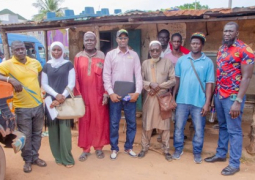
eLMIS is one of the new reform measures that the Ministry is advocating in their quest to track health commodities from the central level to the regional level and there then to the facility and individual levels.
At the forum, Baye Cham, executive secretary at the Country Coordinating Mechanism of the Global Fund chair (CCM), expressed delight to be part of the event.
He recalled that several initiatives were undertaken to have the electronic or digitalised information sharing mechanism but was hampered by challenges.
"But today we are happy to have come to this stage. This system has been piloted in several health facilities in the country and now is being rolled out."
The initiative, he added, is part of the digitalisation process of the Ministry with systems and to be able to control and manage information for planning and implementation.
Cham expressed optimism that the initiative would not be a white elephant initiative but would be used for its intended purpose.
He reminded that medicines are a critical commodity in health system and as such its 'timely availability is always required'.
Also speaking, Dr. Sam Mills, World Bank task team leader in The Gambia, reminded that drugs shortages has been a major problem in The Gambia.
He made reference to a recent survey by The Gambia Bureau of Statistics (GBoS) which involves interviewing people across the country.
"The survey revealed that for those who fell sick, spent an average of four thousand dalasis. Out of this amount, two thousand eight hundred dalasis is spent on medication alone."
This, he added, means that people go the health facilities when they fell sick and drugs are prescribed but they are not able to obtain these drugs at the health facilities.
"They had to go elsewhere to buy it. Can you imagine spending such an amount of money on drugs and what about if you fell sick two or three times in a year?"
Dr. Mills noted that something must be done to address that issue, further expressing optimism that with the forthcoming launch of the National Health Insurance Scheme, the Central Medical store will be fully stocked to meet the needs of the people.
However, he added, this cannot be done with the paper-based system, thus the need to embrace the digital information system to meet the needs of the people.
In his opening remarks, Babanding Sabally, deputy permanent secretary, Technical at the Ministry of Health, recalled that the journey to the day started three years earlier when the Directorates of Pharmaceutical Services and Planning and Information System together with other programmes put a proposal to the World Bank and Global Fund to digitalise the country's logistic and management information system.
This proposal he said was accepted by the world community to move from paper-based logistic management system to a more robust electronic logistics management system.
He spoke of the numerous benefits the initiative comes along with, noting that it will ensure quality and accurate data from all levels.
The system, he added, would also completely eliminate drugs shortages by ensuring timely delivery of the much-needed drugs in various health facilities across the country.




